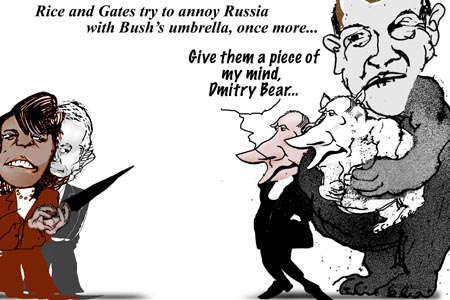Search
Recent comments
- narrative control....
1 hour 35 min ago - chabad....
6 hours 51 min ago - back to the kitchen....
6 hours 53 min ago - loneliness....
9 hours 2 min ago - insight....
9 hours 33 min ago - conspiracy....
1 day 5 hours ago - brutal USA....
1 day 7 hours ago - men....
1 day 7 hours ago - oil....
1 day 8 hours ago - system....
1 day 8 hours ago
Democracy Links
Member's Off-site Blogs
beware neo-cons bearing gifts .....

United States Secretary of State Condoleezza Rice & Defence Secretary Robert Gates are due in Moscow today for talks with their Russian counterparts.
America's controversial missile defence shield is expected to be high on the agenda. One recent bone of contention between the United States and Russia has been America's plans for missile defence facilities in Poland and the Czech Republic.
Russian President Vladimir Putin has said they could represent a threat to Russia's security, so it may have to re-target some of its missiles at those countries.
The American missile defence shield is expected to be prominent in talks over the next two days between Dr Rice and Mr Gates, Russian Foreign Minister Sergei Lavrov and his defence colleague Anatoly Serdyukov.
- By Gus Leonisky at 17 Mar 2008 - 10:17pm
- Gus Leonisky's blog
- Login or register to post comments
money global bubble...
By Alexei Bayer
In a sign that the U.S. economy is starting to tank, I find myself discussing economics with people who ordinarily shun such subjects. My professional contacts -- financial advisers, stockbrokers and money managers -- have already been hurt by the financial crisis. Pervasive news coverage of economic problems, such as the collapse of venerable Bear Stearns over the weekend, is getting even ordinary Americans worried.
In Russia, it is still business as usual. Even top executives remain sanguine. Even as the dollar fell below the Swiss franc for the first time ever and Bear Stearns disappeared, oil hit $111 per barrel and gold surpassed $1,000 per ounce. On top of continued inflows of petrodollars, Russia has hard currency reserves of more than $156 billion and a stabilization fund of roughly $486 billion. Why should anybody in Russia be concerned with an esoteric corner of the U.S. mortgage market?
People tend to think of the economy as a collection of isolated segments. There is the housing market and there is Wall Street -- and they have their place of employment, which has no link to the other two. Why, many Russians wonder, should the U.S. financial crisis affect their jobs, especially if it happens to be on the other side of the globe? It is as though a fire in the Konkovo district of Moscow forced an evacuation at the Metropolitan Opera in New York.
In reality, the modern economy is a single, seamless entity linked across national borders and nourished by the global financial system. We are probably witnessing the early stages of the crisis of the financial system, which will be felt everywhere around the world, from Astrakhan to Zurich and points in between.
In this decade, monetary conditions have been unusually lax. The U.S. Federal Reserve, led first by Alan Greenspan and then Ben Bernanke, kept dollar interest rates artificially low. The surfeit of money ended up on corporate balance sheets and at banks. Easy credit and plentiful liquidity created price bubbles in a variety of markets, from stocks to art and commodities, funding a dramatic rise in real estate prices and a leveraged buyout spree.
The dollar is the world reserve currency, and when the Federal Reserve prints too many dollars, there is little foreign central banks can do to limit money supply at home. Americans paid dollars for imported goods and natural resources, which meant that the rest of the world also became oversaturated with liquidity. Much like the rest of the world, Russia experienced an explosion of lending. Russia's consumer loans rocketed over the past five years, from around $5 billion in 2003 to more than $100 billion last year.